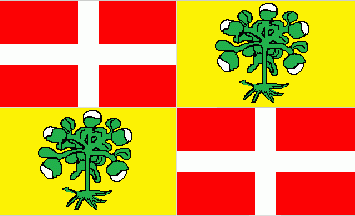 image
by Klaus-Michael Schneider, 21 November 2008
image
by Klaus-Michael Schneider, 21 November 2008
Last modified: 2013-06-25 by rob raeside
Keywords: sovereign and military order of malta | cotoner |
Links: FOTW homepage |
search |
disclaimer and copyright |
write us |
mirrors
 image
by Klaus-Michael Schneider, 21 November 2008
image
by Klaus-Michael Schneider, 21 November 2008
See also:
The two Grandmasters with the same name were Rafael Cotoner (1660-1663) and Nicolas Cotoner (1683-1680). As far as I know they were brothers. I do not know, which one it was, but that doesn't really matter, for both Grandmasters had the same coat of arms and therefore the same flag.
Flag of Grandmaster Rafael de Cotoner y de Oleza (1660-1663)
It is a
quarterly divided rectangular flag. The 1st and 4th quarter are showing the
white Greek cross in a red field of the Order of St. John. The 2nd and 3rd
quarter are showing the personal arms of the grandmaster. In a golden (= yellow)
field is a cotton bush in natural colour, i.e. green with white blossoms.
Source: I spotted an image of this flag in Malta National Maritime Museum on 2
October 2008.
Klaus-Michael Schneider, 21 November 2008
According to
http://www.smom-za.org/smom/grandmasters/60.htm:
"Grand Master Raphael
Cotoner was a prudent and a religious man. He commissioned the celebrated
Mattia Preti to paint the vault of St John's but he was not destined to see the
magnificent pictures of this genius who in 13 years turned the conventional
church into a gem of art. "Nicholas Cotoner was quite a different character. He
was stubborn, impetuous and quick-tempered. He took great interest not only in
St John's but also improved the Sacra Infermeria and built vast fortifications
which still bear his name. During the reign of the Cotoner brothers, Valletta
became a gay city, a centre of continuous feasting, and its Carnival outlived
those of Rome and Venice. They were both great builders and their escutcheon is
over the facades of most palaces, churches and fortifications in Valletta and
other parts of the island. However, St John remains their greatest contribution
which they both loved and beautified. Theirs was a period of prosperity in the
islands but their mania for building and extravagant tastes was a drain on the
Treasury."
Santiago Dotor, 16 March 2006